10% Off Sitewide Sale + Free Shipping No Minimum*
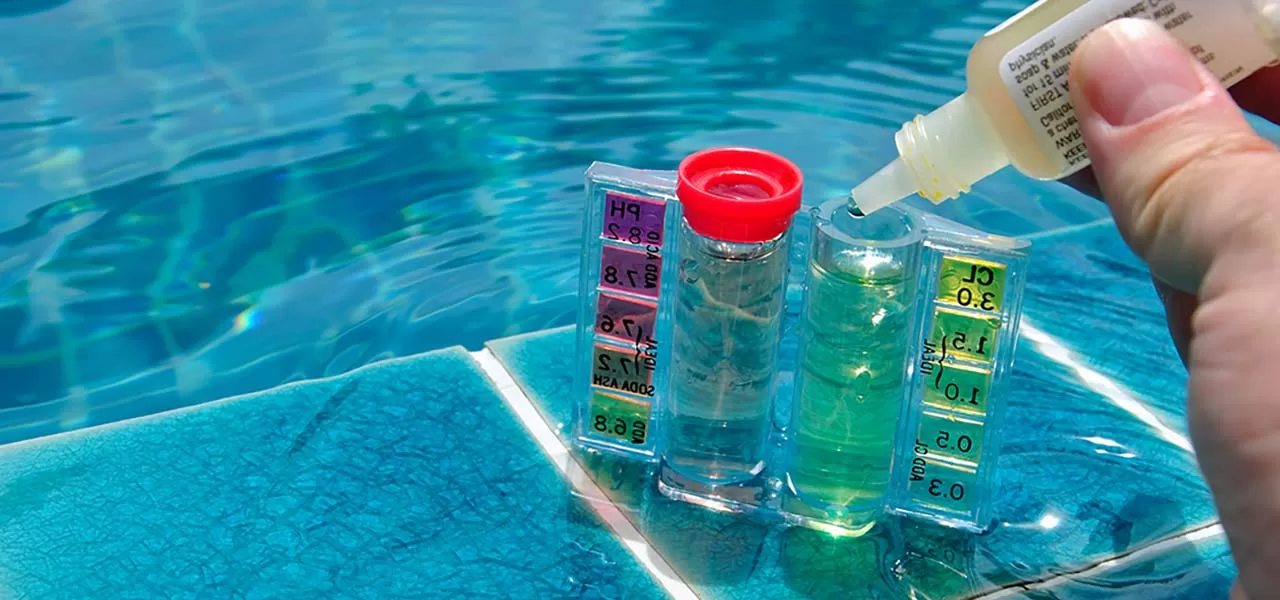
Beginner's Guide to Pool Water Testing
We have all heard of “testing the waters.” But when it comes to swimming pool care and maintenance, water testing is the best route to ensure you have an easy-to-maintain pool. It's more than just eyeballing the water condition or touching the water to detect the temperature. Test kits, strips, and digital readers are used to check pool water balance levels.
Why Test Pool Water?
Without water, a swimming pool is just a hole in the ground. And without clean, clear, healthy water, swimming is just no fun at all.
Since swimming pools are generally used by multiple people at any given time, it is imperative to test and treat pool water regularly. Not only does it keep the water clean and prevent the spread of infectious diseases, it also enhances the pool experience and prevent damage to your pool and equipment.
What Water Tests Are Needed for a Pool?
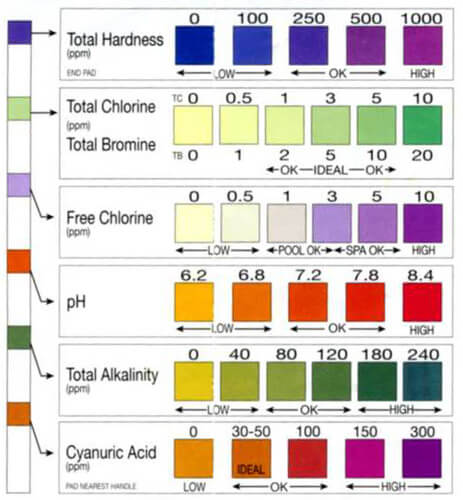
In order for us to have a sparkling clean and well-balanced pool, we have to ensure that the water chemistry levels stay within the following ideal ranges:
- pH: 7.4-7.6
- Total Alkalinity: 80-120 ppm
- Calcium Hardness: 200-400 ppm
- Free Available Chlorine: 2.0-4.0 ppm
- Bromine: 3.0-5.0 ppm
- Cyanuric Acid: 30-50 ppm
- Metals: 0 ppm
- Phosphates: 0 ppm
- Total Dissolved Solids: 0-2500 ppm (non-salt water pools)
Of course, there are instances when test results might fall slightly outside of these ranges, and that's usually OK! As long as you're actively making adjustments to water chemistry and trying to maintain water in the ideal range, you're on the right track.
Testing your pool water and maintaining perfect chemical harmony isn't rocket science. However, it definitely involves regularity and consistency on your part.
How Often Should I Test Pool Water?
We recommend testing your pool water at least once per week. Add chemicals if you see an increase/decrease in ideal chemical levels. If you're unfamiliar with your pool's water balance trends, the pool is used frequently, the weather is exceptionally warm, you're having water clarity issues, or if a storm recently rolled through your yard, you may need to test more frequently – at least 2-3 times per week.
pH and Free Available Chlorine levels should be tested more often, perhaps daily, until you come to a good understanding of how they fluctuate. Other readings for Calcium Hardness, Total Alkalinity, Cyanuric Acid, Metals, Phosphates, and Total Dissolved Solids, tend to move more slowly and can be tested weekly or even monthly in some cases.
Many basic test kits will at least cover your weekly testing needs. But you may need to purchase a more robust kit for monthly testing. You can also bring a water sample to your local pool store to gain a full picture of pool water health.
How Do I Test Pool Water?
There are several types of testing supplies available on the market, all varying in price and accuracy. It's important to remember that certain factors will influence the accuracy of your water test. Ensure that your testing supplies haven't expired, and keep them stored in a dry area at room temperature.
Circulate the pool on the pump's high setting for at least an hour before pulling a water sample for testing. Test results from stagnant water may not be very accurate. Next, gather your water sample around elbow deep, or about 12-18" below the surface. Avoid sampling near pool returns or floating chemical dispensers.
Once you have your test results, keep track of them. You can use a daily planner, dedicated pool calendar, or enter them into your favorite pool care app. Recording water balance trends will help you anticipate future changes in water chemistry, making it easier to maintain water balance over time.
Now that you're familiar with how to test pool water, let's take a closer look at the different types of water tests available.
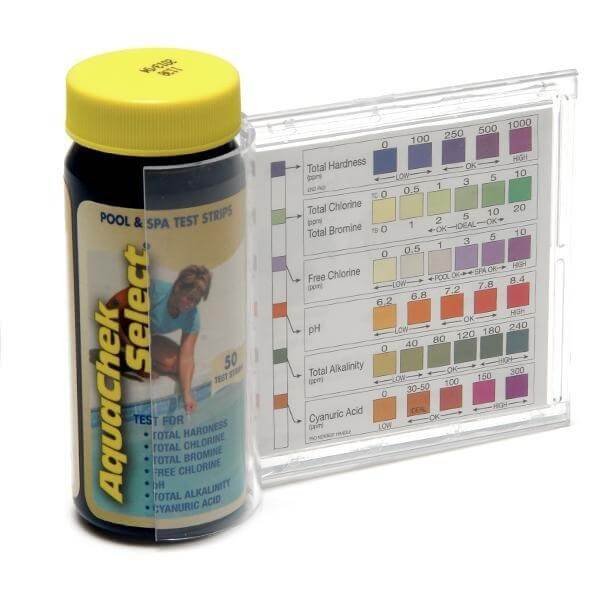
Pool Test Strips
Test strips are the most inexpensive and widely used method for testing pool water. They're fast, easy, and fairly accurate. Some of the more basic strips can test for individual chemicals, or you can buy something like the AquaChek Select 7-Way Test Strips to make multiple tests at the same time.
The most appealing feature of test strips, other than their low price, is that they are very simple to use. Just dip them in water, shake off the excess, and read the results within seconds. Test strips are usually color coded and come with an easy-to-read chart right on the bottle.
Liquid Test Kits
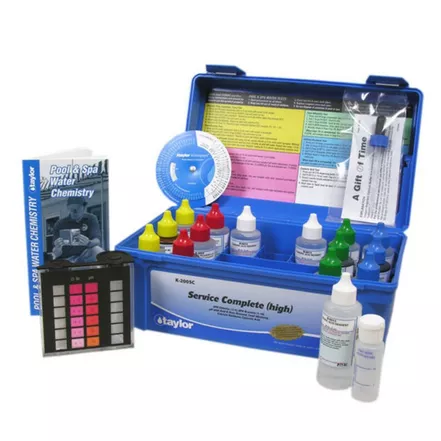
Liquid test kits are one of the most accurate ways to determine chemical levels in your pool. They're higher in price compared to testing strips. However, liquid titration kits offer a more reliable and complete testing solution. Liquid testing kits make use of reagents, which are added to the water sample one drop at a time. Results are determined based on the number of drops and the color of the sample.
Liquid testing kits like the Swimline 4-Way Test Kit are economical and easy to use. Some like the Taylor Basic Residential DPD Test Kit take maintenance a step further, and include a dosage chart for translating test results into treatment. For a more complete water chemistry analysis, the Taylor Complete Test Kits are the way to go.
Digital Pool Testers
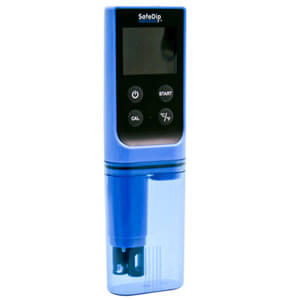
What is the first thing that comes to mind when you hear the word digital? Probably the words "accurate" and "fast," right? When it comes to digital water testers, accuracy and promptness are exactly what you get. Extremely easy to use, the digital water testers often feature LCD displays, water-resistant housing, and even a memory function to view results history. Unlike other types of water tests, there's no need for color matching on your part, so reading the results in digital format is a snap.
Digital pool testers come in a couple different types. Some, such as the Solaxx SafeDip MET20A, have electrodes that measure chemical levels in the water itself, and can provide an accurate measure of water chemistry. Another type of digital tester is kind of a hybrid tester, and uses either a test strip (AquaChek TruTest) or reagents (LaMotte ColorQ) to determine results. This second type of digital tester removes the margin of error associated with results determined by the naked eye, and can be especially helpful for pool owners with colorblindness. Of course, digital testers are more on the expensive side, but they provide a reliable, complete, simple, and fast water testing solution.
EXPERT TIP: Looking for the most precise and reliable at-home water testing system? Look no further than Leslie's AccuBlue Home®! This revolutionary system allows you to enjoy the state-of-the-art AccuBlue® technology all from the comfort of your own home. Want to learn more? Click HERE!
Which Pool Water Test Should I Get?
As a pool owner, you know that pool maintenance is not easy and does not come at the flip of a switch. Regular pool testing is an important step in preventing serious pool problems. All three of the water testing solutions above are a great way to test your water each week.
So now the ultimate question: should you use test strips, test kits, or a digital water tester? The type of pool test you use ultimately depends on budget and the level of accuracy you want in your pool tests. It's a sliding scale between cost, completeness, and testing accuracy. Test strips cost the least with a marginal level of accuracy, whereas a liquid test kit costs more but has better results. Digital readers are the most precise of the three, and can help rule out [most] human error, but they're often on the highest end of the price scale.
Here's a tip used by many of our pool customers. If you're looking to save money without sacrificing testing accuracy, use test strips for regular maintenance checks 2-3 times each week. Then use a more expensive liquid test kit once a week to confirm water balance levels and get a more complete picture. Fill in any remaining gaps with a professional water test at your local pool store.
OK, so what's the best pool test kit? Below are some of our most popular test kits test strips in order of Fair, Good, Better, and Best. All of these tests are top quality. The main difference between them is the number of different water tests they perform. In terms of accuracy, the liquid drop-style pool test kits will always give more accurate results than test strips. But for quick and easy results on a daily or weekly basis, test strips are great for a general analysis.
Best Pool Water Test Kits
Fair: 2-Way Test Kit
- Total Chlorine with OTO
- pH with Phenol Red
- Includes Clam-Shell Case
- Inexpensive Starter Kit
Good: 4-Way Test Kit
- Free and Total Chlorine with DPD
- pH with Phenol Red
- Acid Demand
- Total Alkalinity
Better: Taylor Complete DPD Test Kit
- Free and Total Chlorine with DPD
- pH with Phenol Red
- Acid Demand
- Base Demand
- Total Alkalinity
- Calcium Hardness
- Cyanuric Acid (Stabilizer)
Best: Taylor FAS-DPD Test Kit
- Free and Total Chlorine with FAS-DPD
- pH with Phenol Red
- Acid Demand
- Base Demand
- Total Alkalinity
- Calcium Hardness
- Cyanuric Acid (Stabilizer)
Best Pool Water Test Strips
Good: Aquachek 4-Way Yellow
- Free Chlorine
- pH
- Total Alkalinity
- Cyanuric Acid
Better: Aquachek 7-Way Silver
- Free Chlorine and Total Chlorine
- Total Bromine
- pH
- Total Alkalinity
- Calcium Hardness
- Cyanuric Acid
Best: Aquachek 7-Way Select or Select Connect
- Free Chlorine and Total Chlorine
- Total Bromine
- pH
- Total Alkalinity
- Calcium Hardness
- Cyanuric Acid
- Includes flat comparator, log book, and treatment guide
- Mobile app available for digital analysis through AquaChek Connect
The best pool test kits will have the ability to test all five main water balance levels: pH, Total Alkalinity, Calcium Hardness, Cyanuric Acid, and Chlorine or Bromine. You may need to purchase specialty test kits or rely on professional testing to fill in the gaps for things like Metals, Phosphates, Salt, or Total Dissolved Solids.